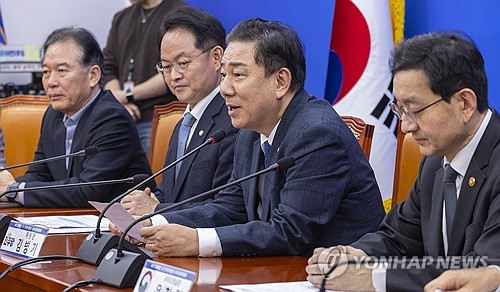(Sejong=Yonhap Infomax) Wook Choi – The Democratic Party of Korea has introduced a special bill on US-bound investments, including the temporary establishment of the Korea-US Strategic Investment Corporation, as a follow-up to the memorandum of understanding (MOU) on Korea-US strategic investment.

Once the relevant details are published in the US Federal Register, tariffs on automobiles and auto parts exported to the US will be retroactively reduced from 25% to 15% effective November 1.
Kim Byung-ki, Floor Leader of the Democratic Party, formally proposed the “Special Act on the Management of Korea-US Strategic Investment (US Investment Special Act)” on the 26th. This move follows the MOU signed between South Korea and the US on November 14 regarding strategic investment cooperation.
With the submission of the special bill to the National Assembly, the conditions for retroactively applying the reduction in US-bound auto and parts tariffs (from 25% to 15%) as of November 1 have been met.
The bill outlines the framework and procedures for strategic investment, the establishment of the Korea-US Strategic Investment Fund, and the temporary creation of the Korea-US Strategic Investment Corporation.
The decision-making structure for strategic investments will consist of a multi-layered system: an Operations Committee within the Korea-US Strategic Investment Corporation and a Project Management Committee within the Ministry of Trade, Industry and Energy (MOTIE). The Minister of Economy and Finance will chair the Operations Committee, while the Minister of Trade, Industry and Energy will chair the Project Management Committee.
Notably, the bill stipulates that the Operations Committee, Project Management Committee, and the Minister of Trade, Industry and Energy must comply with the safeguards specified in the MOU.
First, within the annual remittance cap of $20 billion, disbursements must be made in consideration of project progress. If the execution of US-bound investments is expected to cause instability in the foreign exchange market, the amount and timing of investments must be adjusted accordingly.
Furthermore, only commercially viable investment projects will be eligible for recommendation by the US Investment Committee, and strategic and legal considerations—including potential conflicts with domestic law—must be presented to the US side.
The bill also requires that, when selecting vendors, suppliers, and project managers for the projects, Korean companies or individuals should be recommended and consulted with the US side wherever possible. Additionally, the need for US government support during project implementation must be reviewed and discussed with US authorities.
If it is anticipated that investment recovery for individual US-bound projects will be difficult within the 20-year period, the bill includes a provision to negotiate the adjustment of cash flow distribution ratios with the US.
According to the special bill, the Korea-US Strategic Investment Fund will be established to efficiently and systematically manage and operate resources for strategic investment. The fund will be sourced from the government and the Bank of Korea’s entrusted foreign reserve management profits, as well as government-guaranteed bond issuances overseas.
These resources will be used for US-bound investments (up to $20 billion annually) and for financial support such as guarantees and loans for shipbuilding cooperation investments, as stipulated in the MOU.
The Korea-US Strategic Investment Corporation will be established as the managing and operating entity of the fund. The corporation will be funded by government capital, operated temporarily for up to 20 years, and dissolved according to legal provisions. Its statutory capital is set at 3 trillion won ($2.2 billion). The corporation’s operations may be entrusted to existing policy financial institutions such as Korea Development Bank, Export-Import Bank of Korea, Korea Trade Insurance Corporation, and Korea Investment Corporation to leverage their expertise.
The Ministry of Economy and Finance stated, “With the introduction of this special bill, the requirements for retroactively applying the reduction in auto and parts tariffs to 15% as of November 1 have been met,” adding, “This will help reduce uncertainty for Korean exporters to the US.”
The Ministry of Trade, Industry and Energy has notified the US Secretary of Commerce that the special bill has been submitted to the National Assembly and requested prompt publication in the Federal Register, including the retroactive application of the tariff reduction to November 1.
Once the US Federal Register publishes the relevant notice, auto tariffs will be retroactively reduced from 25% to 15% effective November 1.
wchoi@yna.co.kr
(End)
Copyright © Yonhap Infomax Unauthorized reproduction and redistribution prohibited.

